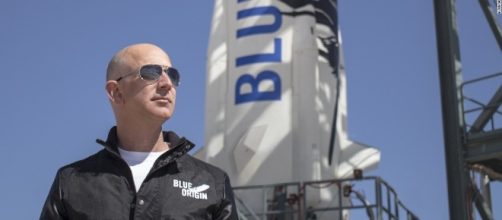When Blue Origin’s Jeff Bezos announced his new, orbital, partially reusable rocket, the New Glenn, he also teased an even bigger rocket, the New Armstrong, that is planned for further down the road. The fact that New Glenn has more than half the lift capacity of a Saturn V has caused Ars Technica’s Eric Berger to speculate that the founder of Amazon.com’s ultimate goal is a private program to colonize the moon.
In a way, such an idea makes more sense that SpaceX’s Elon Musk’s open desire to create a Mars colony. The moon is close at hand, three days away as opposed to six months to a year away.
The moon, as Moon Express’s Naveen Jain once pointed out, has quadrillions in mineral wealth just waiting for the taking. A study conducted by NextGenSpace last year suggested that moon boots could be on the lunar soil for about $10 billion in the second term of the next president. Bezos, whose net worth is estimated at just shy of $67 billion and whose Amazon.com is an engine for making money, might just pull the thing off if he is determined and patient enough.
The creation of so much lift capacity, along with SpaceX’s Falcon Heavy, likely delayed because of the recent Falcon 9 accident, and the Space Launch System, represents a rare opportunity for a near-term return to the moon. Companies just Moon Express are already developing serious plans to mine the Earth’s nearest neighbor for its mineral wealth.
Bigelow Aerospace has developed the concept of inflatable habitats on the lunar surface. The European Space Agency is touting the idea of a “Moon Village.”
Bezos could put together a private lunar effort on his own dime, with partnerships with other interested companies. If the next president proposes that NASA adds a return to the moon to its manifest on the Journey to Mars, as many have advocated, the only new hardware that would have to be developed would be a landing module capable of taking people and cargo to and from the lunar surface. The public/private return to the moon would fire the imagination of the world and would help to redeem the 21st Century which, thus far, has not been a good one, fraught as it has been by terrorism and political mendacity. Even an entirely private effort, increasingly possible but one that may take a little longer, would change the world in ways that cannot yet be imagined.

